Continuing with the latter portion of the season in which Bugs Bunny came unto his own, causing the venerable Porky Pig to have more than the shadow of a little black duck looming behind him to steal his thunder and usurp his throne.

Tortoise Beats Hare (3/15/41) – The first meeting of Bugs and Cecil Turtle. Bugs takes exception to the title of the cartoon, calling its producers (whose names he mispronounces) “a big bunch of jerks – and I ought to know. I work for ‘em.” One of the first Avery films to use the “multiple look-alikes” trope (excepting Egghead’s audience in Hamateur Night). Songs include “Here We Go Round the Mulberry Bush”, with the rest original score.
Goofy Groceries (3/29/41) – Midnight in a grocery store, as the products again engage in a revue. Historically important for animation’s first “Superman” parody (months before the release of the Fleischer series). The film is also stuffed to the gills with celebrity caricatures, including another “Jack Bunny” salute. Plot? Who needs one? Songs: “Jingle Bells”, “If I Could Be With You (One Hour Tonight)”, “Chicken Reel”, “By a Waterfall”, “I’m Just Wild About Harry”, and “Playmates”.
Toy Trouble (4/12/41) – Sniffles and Bookworm invade a toy department at Macy’s Department Store, and wind up attracting the attention of a cat. A wind-up toy duck with an everlasting mainspring proves an unlikely ally in bringing about the cat’s downfall. Also features a highlight where Sniffles hides out among a row of Porky Pig dolls. A better than average and lively outing for Chuck Jones. Songs” Lullaby of Broadway”, “All This and Heaven Too”, “In An Old Dutch Garden” and “It Looks Like a Big Night Tonight” (the clip below is from the 1944 Warner feature Shine On Harvest Moon).

The Trial of Mr. Wolf (4/26/41) – Big Bad Wolf is suing Little Red Riding Hood for damages unspecified, and tells his side of the story. In this version, Grandma is very much into wolf pelt, and sees Big Bad as fine material for a coat. Features a closing gag that Warners would use at least once more – where the Wolf declares if he’s not telling the truth, he hopes he’s run over by a street car (a modification of the “lightning strike” gag which ended “The Hardship of Miles Standish”.) Ding ding! Songs include “For He’s a Jolly Good Fellow”, “Oh! Dear! What Can The Matter Be” and the Pizzicato from Sylvia.
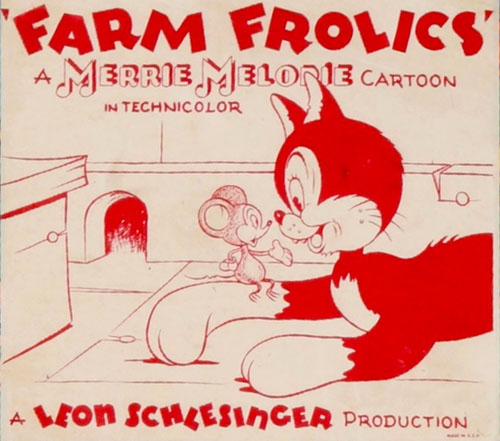
Farm Frolics (5/10/41) – Spot gags (from Clampett, for a change) on the farm, with running gag involving piglets and a clock – as they wait for feeding time. Mom can only say “Every day it’s the same thing.” Songs: “I’m Happy About the Whole Thing” (as a horse performs a “Cantor”), Von Suppe’s Light Cavalry Overture, “Where Has My Little Dog Gone”, and “Playmates”.
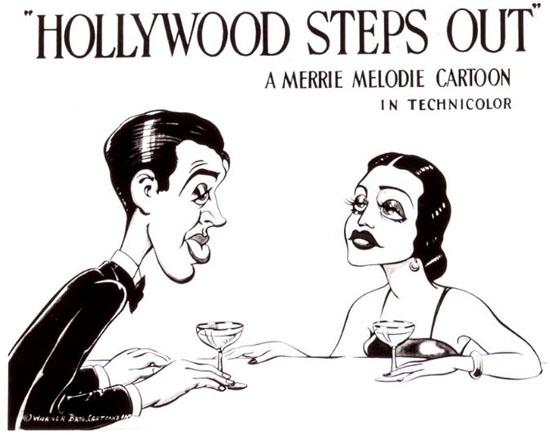
Hollywood Steps Out (5/24/41) – Caricatured celebrities in a night out at Ciro’s – where dinner is $50.00, on easy terms. Name dropping is almost too numerous to mention – memorables include tough guys (Cagney, Raft, etc.) pitching pennies, one of the first takeoffs on Bing Crosby’s horses, a table of “stone faces” (Keaton, Ned Sparks, etc.), Andy Hardy and father getting stuck with the check and dishwashing duties, Sally Strand’s “bubble dance, and Clark Gable in pursuit of a kiss from – Groucho Marx? Songs: “Where Was I?”, “Ahi Viene La Conga” (a latin number recorded by Xavier Cugat for Victor, Desi Arnaz on Columbia, and Nilo Menendez on Decca), “Merrily We Roll Along” (accompanying a table with sme of the studio’s own execs), “Oh, You Beautiful Doll”, “Where Oh Where Has My Little Dog Gone” (a reserved seat for Daisy from the Blondie series), “Congo”, and of course “I’m Forever Blowing Bubbles”.
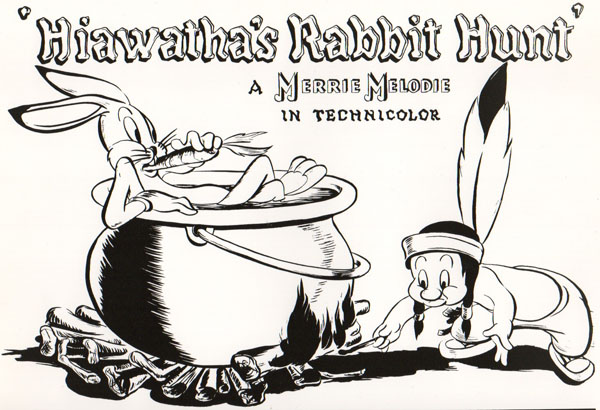
Hiawatha’s Rabbit Hunt (6/7/41) – Longfellow’s poem gets the Termite Terrace treatment. Bugs is hunted by an intellectually-challenged native American, who has no more success than Elmer Fudd. One of the first uses of the idea of a boiling hot pot as a “bath” (a sequence replayed verbatim years later as a clip in What’s Cooking, Doc?). Songs include: “A Hunting We Will Go”, Bugs himself singing “When the Swallows Come Back to Capistrano”, and “By the Waters of Minnetonka”, an art song written by Therlow Lieurance in the 1910’s. It was recorded in 1918 by Barbara Maurel for Columbia. A very popular foxtrot arrangement was recorded by Paul Whiteman in 1924, then electrically re-recorded in 1928. It was also picked up by the black stage band of Sam Wooding, recorded in Berlin for Vox in 1925 and for Polydor in 1926. Eddie South in Chicago recorded it for Victor in 1927. Swing arrangements were done in 1938 by Ray Noble (Brunswick) and Glenn Miller (Bluebird), the latter being an extended-length chart that took two sides of the record.
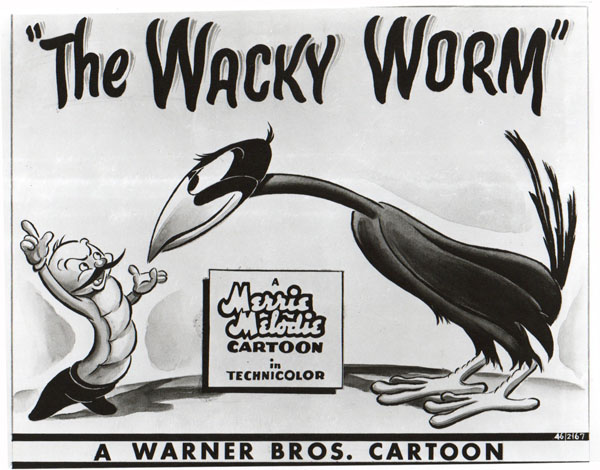
The Wacky Worm (6/21/41) – Friz Freleng’s direct successor to his efforts at MGM on The Bookworm and The Bookworm Turns, lifting his Raven adversary almost intact from such previous titles. However, in order to avoid any accusations of stepping on copyright toes, the worm develops an entirely new personality – a mustachioed caricature of Jerry Colonna. Songs: “In Caliente”, “Day Dreaming (All Night Long)”, “and “It Looks Like a Big Night Tonight.”
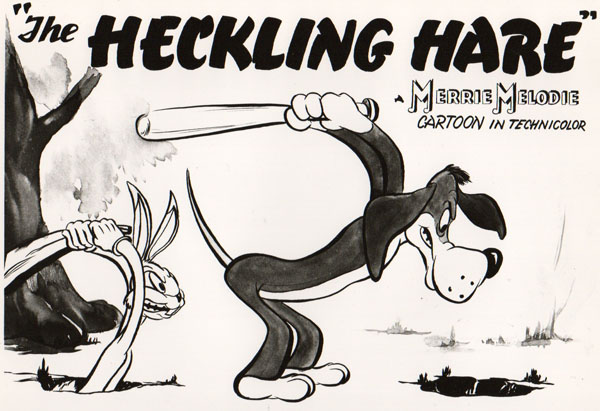
The Heckling Hare (7/5/41) – The cartoon that got Tex Avery fired from Warner Brothers. Notorious for its rushed ending, caused by Schlesinger cutting off the last 40 feet of the picture for its alleged resemblance to a then-current dirty joke. Another chase cartoon featuring Avery’s recurring hound Willoughby in pursuit – and climaxed by the world’s longest fall off a cliff – perhaps only exceeded by Bugs’ later plummet in a dive bomber in Falling Hare. The score includes the inevitable “A Hunting We Will Go”, Mendelssohn’s Spring Song”, “Fountain in the Park (Strolling Through)”, and “I’m Forever Blowing Bubbles”.
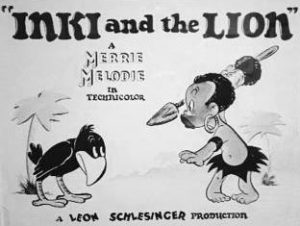 Inki and the Lion (7/19/41) – A nearly identical redo of “The Little Lion Hunter”, with another comeback for the mysterious Mynah Bird. No current pop tines – just the Bird’s usual entrance cue of “Fingal’s Cave”.
Inki and the Lion (7/19/41) – A nearly identical redo of “The Little Lion Hunter”, with another comeback for the mysterious Mynah Bird. No current pop tines – just the Bird’s usual entrance cue of “Fingal’s Cave”.
Aviation Vacation (8/2/41) -Spot gags built around a round the world airplane trip. The plane winds up as part of an amusement park ride after getting lost in a thick fog. Also Avery’s first use of the animated ‘hair-in-the-projector” gag, which he would later perfect in MGM’s Magical Maestro. Songs: “April Showers”, “Brahms’ Lullaby”, “California, Here I Come”, and “When Irish Eyes Are Smiling”, part of the standard repertoire of the Irish tenor, as exemplified by John McCormack on Victor, and by every other such singer subsequently, including Dennis Day on Victor, and even Bing Crosby (???) on Decca. Here’s a clip of Dennis Morgan crooning it from the 1940 Warner Bros. feature Tear Gas Squad:
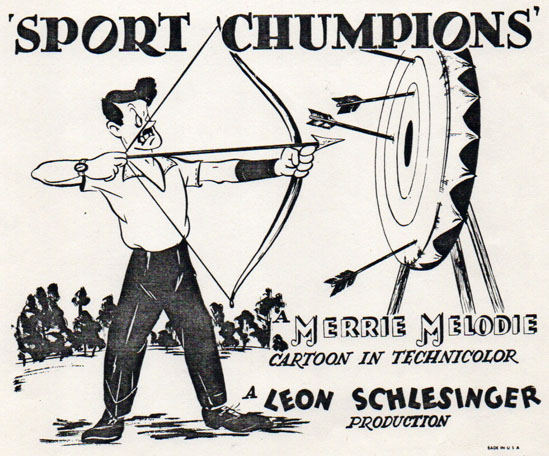
Sport Chumpions (8/16/41) – More spot gags in the form of a sports highlight reel, popular in the day from the Pete Smith Specialties at MGM. Not only are major sports covered, but items such as archery and six-day bicycle races (monotonous, isn’t it?). “Blue Danube Waltz”, “Sidewalk Serenade” and “Frat” sneak into Stalling’s score, along with a suggestion of “The Darktown Strutter’s Ball” while the swimming sequence shows us “another popular dive” (with swinging doors).
Next: Looney Tunes 1941-42.


 James Parten has overcome a congenital visual disability to be acknowledged as an expert on the early history of recorded sound. He has a Broadcasting Certificate (Radio Option) from Los Angeles Valley College, class of 1999. He has also been a fan of animated cartoons since childhood.
James Parten has overcome a congenital visual disability to be acknowledged as an expert on the early history of recorded sound. He has a Broadcasting Certificate (Radio Option) from Los Angeles Valley College, class of 1999. He has also been a fan of animated cartoons since childhood.










































Before “Goofy Groceries”, there is an earlier reference to Superman in “Tortoise Beats Hare”, although the character is only mentioned, not seen. When Bugs pounds on Cecil’s door and shouts “Come on out of there, Superman!”, I don’t think he’s using the term in its Nietzschean sense.
In the same cartoon, when all of Cecil’s relative are phoning each other, the music is from Mendelssohn’s “Athalia” Overture. Stalling used the same passage in other cartoons, but I can’t offhand think of which ones.
Re: The Heckling Hare – so what was the dirty joke?
Tex Avery told his biographer Joe Adamson that “The Heckling Hare” originally ended with Bugs and Willoughby falling off three cliffs in succession, and as they went down for the third time Bugs said: “Hold onto your hats, folks! Here we go again!” This was supposedly the punchline of a dirty joke that was circulating at the time, one that was never written down and has since been forgotten. Tex said that Leon Schlesinger cut the ending because of that off-colour reference, and Tex resigned in protest against the censorship of his work. This story has been repeated many times over the years.
However, historian Michael Barrier uncovered a typewritten dialogue transcript of “The Heckling Hare” (studios had these made for copyright purposes). It mentions the three falls at the end, but the “Hold onto your hats” line is absent. The rest of the dialogue in the cartoon was transcribed accurately.
It seems that Schlesinger made the cut not because of any risque content, but because the ending simply dragged on for too long. Avery either misremembered or embellished the story.
If I have made any errors or omissions in this account, I welcome any corrections that will help set the record straight.
Paul, I concur with your account of what happened. Personally I think Schlesinger suspended Avery NOT because of that line (which may never have been there), but because Schlesinger didn’t think it was funny that Avery was killing Leon’s new cartoon star – not once but three times!
From what I understand Avery was not fired, but “suspended”. Perhaps if he hadn’t found work at Paramount or MGM he would have returned to Leon – and welcomed back.
Then at MGM, he killed-off-for-real both Screwy Squirrel *and* George and Junior in their final appearances!
Sad, isn’t it?
Don Marksteins’s Toonopedia has another version of the story: That Tex Avery and Leon Schlesinger got into a heated argument about the proposed series ‘Speaking of Animals’ and Tex was suspended for 8 weeks. Avery then sold the series to Paramount, and when the 8 weeks was up he decided not to return to Warner Brothers. http://www.toonopedia.com/avery.htm Any possibility this has merit?
These songs also play in Sport Chumpions:
* The Merry Carousel – Frank Weldon (start of skiing scene)
* College Stunts – J.S. Zamecnik (start of football scene)
* Shooting the Chutes – L.E. De Francesco (auto racing scene)
Stallling’s scores seemed to get lighter around this time — more strings, less deep woodwinds — just as the opening title music he finally settled on in early ’41 for the Merrie Melodies had a lighter tone than what came before it and meshed with the improving animation of the cartoons that allowed the gags to register on film as well as they did on the storyboard.
The ~41-45 Merrie Melodies theme (https://www.youtube.com/watch?v=2pEFshKsDF0) is my personal favorite. It got a bad association because it was used on all those Blue Ribbon re-releases that nixed the title cards, but the arrangement itself is so infectious and fun, and a big improvement over all the variants from the late ’30s and 1940 season.
In The Trial of Mr. Wolf, when the Wolf is skipping along full of the spirit of brotherly love, the tune that’s being played is Gossec’s “Gavotte”, which Stalling often used in his scores, not the Pizzicato from Sylvia.